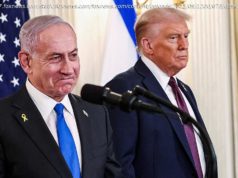 President Donald Trump is embracing the idea of Guantanamo Bay as a jail for terror suspects, a repudiation of the Obama administration’s longtime push to prosecute captured militants in the U. S. court system.
President Donald Trump is embracing the idea of Guantanamo Bay as a jail for terror suspects, a repudiation of the Obama administration’s longtime push to prosecute captured militants in the U. S. court system.
A draft order spelling out a tougher line in the fight against terror dramatically rethinks how the U. S. should detain, monitor and prosecute terrorist suspects. It would reverse Obama’s efforts to close the military detention center at Guantanamo Bay, Cuba, and reopen the idea of establishing CIA detention facilities outside the United States.
In its support of Guantanamo the document is likely to renew a debate, which the Obama administration considered closed, about whether military tribunals offshore or civilian trials in American courts offer a fairer and more efficient path to justice.
«To take a step backward would be both practically misguided and morally indefensible,» said Eric Freedman, a constitutional law professor at Hofstra University and a legal consultant for Guantanamo detainees.
«The United States, for better or worse, sets an example for governments and social movements alike throughout the world, and it’s already the case that the groups opposed to American values have made extraordinarily effective use of Guantanamo and its betrayal of American values,» Freedman said.
Though the draft order, which the White House said was not official, takes a more expansive view of national security power, it also in some instances relies on legal authorities that remained in place during the Obama administration but went unused.
Guantanamo was open for the duration of the Obama administration, leaving it available for use by a new administration. And though Obama opted not to indefinitely detain newly captured suspects, courts have recognized the government’s authority to keep without trial suspects captured during wartime and connected to specific terror groups like al-Qaida.
«The authorities are still there, and there’s no legal reason why it wouldn’t be available to a President Trump,» said Stephen Vladeck, a national security law professor at the University of Texas at Austin.
Aspects of the draft order weren’t surprising given Trump’s campaign promise to fill Guantanamo with «bad dudes. » His pick for attorney general, Alabama Sen. Jeff Sessions, said at his confirmation hearing that he thought the prison, opened to take terror suspects after the Sept. 11 terror attacks, had served its purpose «marvelously well. »
Support for it now represents a total reversal of eight years of efforts to close it. The Obama administration sent no new detainees there, and while not fulfilling a promise to close it, whittled the population from 242 to 41.
Obama’s Justice Department maintained that the U. S. civilian court system was the most legally sound forum in which to prosecute terror suspects captured in the U. S. and overseas and cited hundreds of convictions in New York and other cities as proof.
Former Attorney General Eric Holder sought unsuccessfully in 2009 to move the suspected ringleader of the Sept. 11 attacks, Khalid Sheikh Mohammed, from Guantanamo to New York for trial, and though the plan was derailed by political opposition, has since expressed vindication as the military tribunal system at Guantanamo stalled.
The son-in-law of Osama bin Laden, Sulaiman Abu Ghaith, was convicted in New York in 2014 on terror-related charges after being captured in Jordan. Ahmed Abu Khattalah, accused in the deadly 2012 attacks on a State Department compound in Benghazi, was captured in Libya in 2014 and is awaiting trial in Washington, D. C. And despite occasional objections from congressional Republicans, the Justice Department in the Obama administration has consistently used American courts to try suspects captured in the U. S. — including Boston Marathon bomber Dzhokhar Tsarnaev and the man accused in the Manhattan and New Jersey bombings last year.
Sessions and other Republicans have long expressed concern that civilian courts afford legal protections to which suspected terrorists are not entitled. He has warned that valuable intelligence can be lost if a detainee is advised of his right to remain silent and to have a lawyer. But in several major cases, federal officials have used a public safety exemption to interrogate for intelligence purposes high-value suspects, including Tsarnaev, before advising them of their Miranda rights and restarting the questioning.
Arguments that Guantanamo is a better forum than civilian courts have been «debunked by successful prosecution after successful prosecution,» Todd Hinnen, who served as acting assistant attorney general for national security in the Obama Justice Department, said before the new draft order was announced.
«As a result, sending them before a less well-established, less tested system that’s viewed as less legitimate by much of the world, would be a step backward,» Hinnen said.
But Robert Turner, a national security law professor at the University of Virginia, disagreed, saying the military tribunal process has fewer «theatrics» that accompany a civilian court case, where a «fast-talking lawyer» could come in and mislead the jury. The tribunal process, he said, has «no-nonsense rules. »
«I don’t think Gitmo as a detention facility, per se, is one of the problems,» he said.
Still, said Vladeck, the draft document lacked enough «teeth» and specifics for the public to know how much of its agenda could actually be implemented or survive inevitable statutory and political hurdles.
«Morally it’s a terrifying document, but legally, I think it’s mostly a lot of hot air,» he said.






